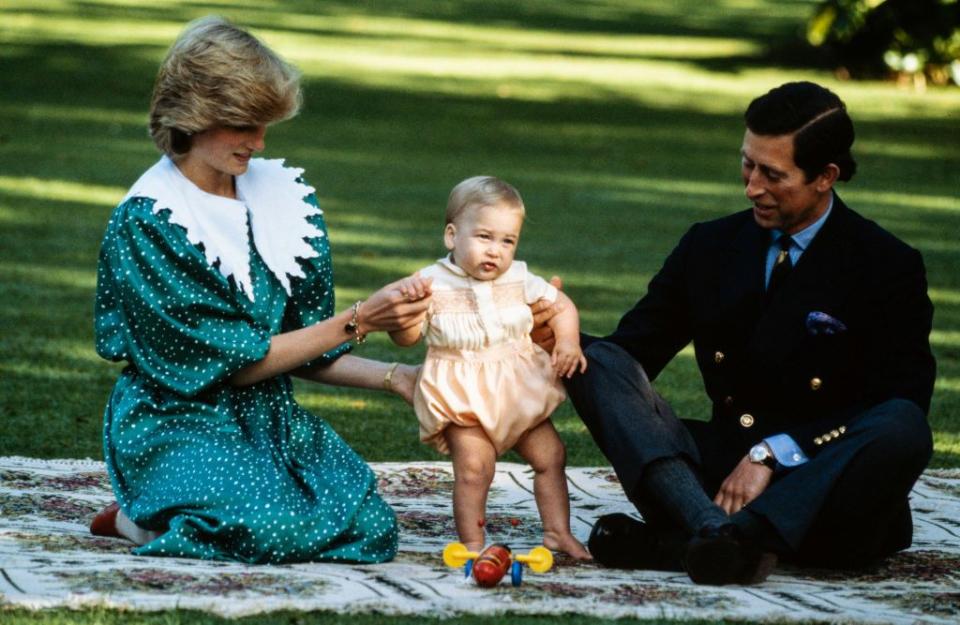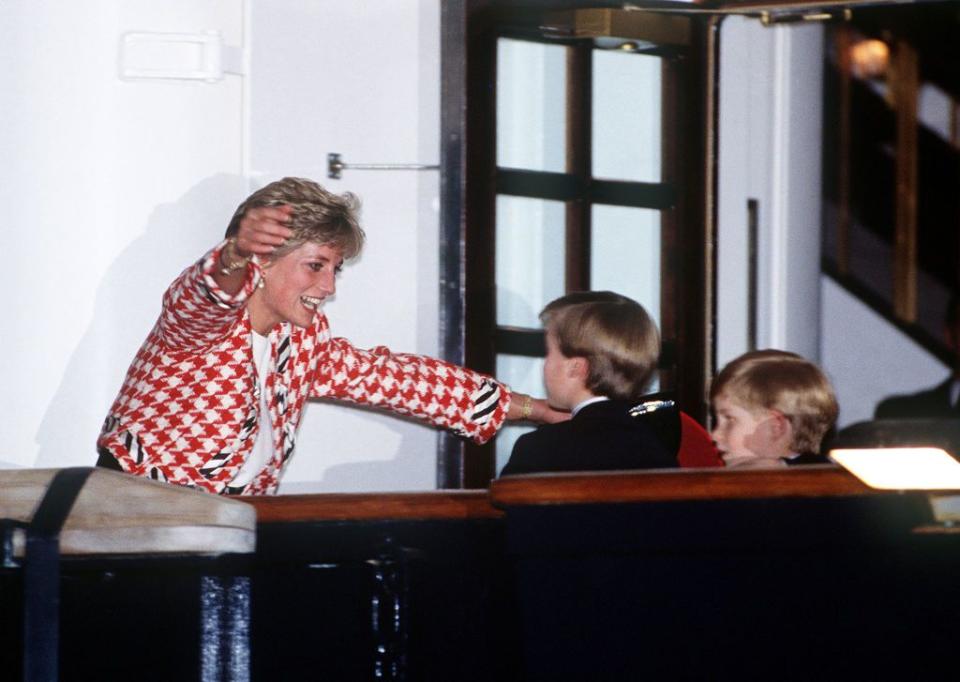How Princess Diana Redefined Royal Motherhood
- Oops!Something went wrong.Please try again later.
- Oops!Something went wrong.Please try again later.
- Oops!Something went wrong.Please try again later.
- Oops!Something went wrong.Please try again later.
In The Crown season 4, Princess Diana (Emma Corrin) takes center stage for the first time in the lavish dramatization of the inner workings of the royal family. While the series focuses on the courtship of Prince Charles and then-Lady Diana Spencer and the ultimate breakdown of the Wales's marriage, viewers do get a glimpse into what drove Princess Diana’s life: motherhood. And while the 10-episode season draws on historical truth for its portrayal of the royal family, it's important to remember that, as creator Peter Morgan has pointed out, the series is not a documentary and many of the scenes are reimagined for dramatic effect. What is not lost, however, is how motherhood shaped Princess Diana, and indeed how the Princess of Wales had a lasting impact on raising royal children.
Diana was not just a trailblazer. She ripped up the royal rulebook. She’s famous for her groundbreaking humanitarian work, but her beloved boys always took top priority in her life. Her influence lives on in the parenthood of Prince William and the Duchess of Cambridge, and Prince Harry and the Duchess of Sussex.
In episode 6, The Crown focuses on the Prince and Princess of Wales's historic tour of Australia. In the past, royal children were left at home and tended to by nannies while Queen Elizabeth and Prince Philip embarked on lengthy overseas tours. All that changed with Princess Diana learned she didn’t have to leave her newborn in London. And so, nine-month-old Prince William accompanied her and Charles Down Under for their six-week tour in March and April 1983. Prince William did spend some time away from his parents at a remote farm in New South Wales, but he delighted Australians with his first royal crawl-about in New Zealand. Diana’s trip with the infant prince paved the way for what has become a royal right of passage.

Nearly thirty years after Charles and Diana's visit, Prince William and Kate returned to Australia and New Zealand with an infant Prince George. Instead of a solo photo op, George joined other young babies in a Wellington, New Zealand playgroup and stole the show at the Taronga Zoo in Sydney. Just two years later, Princess Charlotte was heard speaking for the first time, exclaiming, 'pop' as she played with balloons at a children’s party for military families at the Government House in Victoria, Canada. Canadians, meanwhile, got a glimpse of their two future kings, Prince William and Prince George. Prince Harry and Duchess Meghan followed suit in 2019, taking four-month-old baby Archie to South Africa on their second major tour as a married couple.
Of course, Queen Elizabeth experienced an entirely different path from Diana. After her uncle King Edward VIII abdicated the throne to marry divorcee Wallis Simpson, Princess Elizabeth and Princess Margaret were thrust into the spotlight when her father “Bertie” became King George VI, and Lilibet, as she was called, became heir presumptive. At 25, then-Princess Elizabeth and Prince Philip toured Kenya en route to Australia, and Princess Elizabeth ascended the throne there when her father succumbed to cancer. Queen Elizabeth maintained a more distant, formal relationship with her young children, taking on the immense responsibilities of the monarchy at such an early age. Her children Prince Charles, just shy of 4, and Princess Anne, nearly 2, spent much of their childhood in the company of nannies as their mother balanced her immense workload presiding over the Commonwealth.
Diana changed the dynamic, something unthinkable raising royal children nearly a generation ago. Rather than rely on nannies and bodyguards, the princess took the children to school herself, participated in school events, and guaranteed they experienced the same pursuits as less privileged children. She also showered them with love and affection. Whether sneaking her beloved boys into the movies or smuggling Starburst inside their socks at soccer games, the Princess of Wales put family first.

In the documentary Diana, Our Mother, Her Life and Legacy, Prince Harry described her as the “best mum in the world” who “smothered us with love”: “She would just engulf you and squeeze you as tight as possible. And being as short as I was then, there was no escape, you were there and you were there for as long as she wanted to hold you… All I can hear is her laugh in my head and that sort of crazy laugh of where there was just pure happiness shown on her face.”
Diana was intent on her children living as normal an upbringing as possible, and William and Harry are dedicated to providing their children with the same. “She always understood that there was life outside of palace walls,” Prince William said in ITV’s commemorative documentary of Diana twenty years after her death. “My mother cherished those moments of privacy and being able to be that mother, rather than the Princess of Wales.”
William and Harry have, predictably, embraced modern fatherhood, nurturing their children and remaining fully engaged in their upbringing, as Diana did with them. Whether reading a story or taking part in bath time, William and Harry are equal partners in parenthood and share the responsibilities of raising their children. As Diana accompanied William and Harry to the first day of school, William and Kate have followed suit with George and Charlotte. And like Diana, they've insulated their children from the prying eyes of the paparazzi and make sure their privacy is paramount—without sacrificing the joys of childhood.
Harry and Meghan’s decision to step back as senior members of the royal family in March 2020 was driven in large part by a quest to provide their son and family more privacy. The couple have prioritized Archie and make sure they're present for all his milestones. “We were both there for his first steps, his first run, his first fall, hist first everything,” Meghan told Malala Yousafzai in October 2020, with Harry sharing, “Our little man is our number one priority, but our work after that is the second priority and we’re just trying to do everything we can to do our part to make the world a better place.” This message about duty and service was very much inherited from his mother and grandmother.
At the age of 21, Princess Elizabeth told her future subjects in a radio address, “I declare before you all that my whole life, whether it be long or short, shall be dedicated to your service.” From their very earliest years, Diana introduced William and Harry to what others endured, taking them to a homeless shelter, on private charity visits, and making them aware of her humanitarian work. “I want them to have an understanding of people’s emotions, people’s insecurities, people’s distress, and people’s hopes and dreams. I would like a monarchy that has more contact with its people,” Diana once said of her children.
Her legacy lives on today in the charitable work of her sons and their wives. While Archie is still too young, William and Kate are already introducing these values to their own children: Earlier in 2020, Prince George and Princess Charlotte delivered homemade pasta to the elderly in lockdown due to the COVID-19 pandemic near their Anmer Hall Home on the Sandringham estate in Norfolk.
And William and Kate are committed to making sure their children know the woman who captivated the world. William told ITV in 2017 they are “constantly talking about Granny Diana. So we've got more photos up 'round the house now of her and we talk about her a bit and stuff. And it's hard because obviously Catherine didn't know her, so she cannot really provide that—that level of detail. So I do regularly, putting George or Charlotte to bed, talk about her, and just try and remind them that there are two grandmothers, there were two grandmothers in their lives, and so it's important that they know who she was and that she existed.”
And what does William think about what Diana might be like today with his children? “She'd be a nightmare grandmother, absolute nightmare,” William joked in Diana, Our Mother: Her Life and Legacy. “She'd love the children to bits, but she'd be an absolute nightmare. She'd come and go and she'd come in probably at bath time, cause an amazing amount of scene, bubbles everywhere, bathwater all over the place—and then leave."
You Might Also Like

